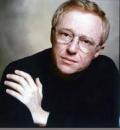David Grossman

Appalled by the violence and hatred haunting his town, David Grossman became from 1973 onward an activist for world peace. In 1978, while aged only 24, he participated alongside writers and intellectuals in the creation of Peace Now, a movement aimed at encouraging dialogue between Palestinians and Israeli, and the creation of a Palestinian state – an ideal which he would thereafter serve with his pen.
In 1983, his first novel, The Smile of the Lamb, was one of the first to openly discuss Israeli occupation of Palestinian territories, a topic which had until then been traditionally voided in Palestinian literature. Three years later, in See Under: Love, Grossman wrote about the tragic fate of children who had survived the Shoah. But his first runaway success undoubtedly was The Yellow Wind (1987), a book relating the living conditions of West Bank Palestinians which granted him international fame – and earned him a public scolding from the country’s Prime Minister, Yitzhak Shamir.
In 1993, Grossman praised the Oslo Accords, which he thought heralded a potential reconciliation between the people of Israel and Palestine, but remained carefully attentive to the situation on the ground. For the next ten years, he chronicled Palestinian attacks on Israeli soils and the progressively worsening living conditions of the Palestinians living under Israeli rule alike, compiling his writings in a 2003 book, Death as a Way of Life: Israel Ten Years After Oslo.
That same year, he began writing To The End of the Land, the story of a woman cstruggling to confront the death of her soldier son. The book was largely complete by August, 2006, when, in a tragic twist of fate, reality met fiction and Grossman’s 20-years-old son Uri was killed in the war between Israel’s forces and the Lebanese Hezbolla just days after his father had urged his government to accept a ceasefire. To The End of Land was finally published a few years later, in 2008 – a powerful book that depicting the emotional strains that family members of soldiers experience when their loved ones are deployed into combat, an experience shared by many in his own country.
His last book, Falling Out Of Time (2012), was a study in grief and mourning, in which a father tries his hardest to deal with the death of his son. Grossman received the Peace Prize of the German Book Trade and the JQ Wingate Prize for The End of Time. Grossman is also an Officer in the French Order of Arts and Letters.
David Grossman is without a doubt one of Israel’s most talented novelists. In his novels and his nonfiction works alike, Grossman tirelessly seeks to understand and analyze his own opinion, but also that of his opponents. He never ceased to denounce violence and hatred in his home region and preaches dialogue and the ability to listen as the only ways of putting an end to them. A supporter of peace between Israel and Palestine, Grossman, often derided as a “naïve idealist” by his opponents, has never shied away from using his pen to serve what he sees as a just cause. In his acceptance speech of the prestigious German Trade Book Prize, he expressed the hope that “Israel, [his] country, will find the strength to rewrite its history again. That it learns to grasp its past and its tragedies in a new way and to reinvent itself in a new way because of that.”
Video :
